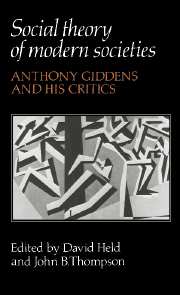Book contents
- Frontmatter
- Contents
- List of contributors
- List of abbreviations
- Editors' introduction
- 1 Social theory as critique
- 2 Hermeneutics and modern social theory
- 3 The theory of structuration
- 4 Models of historical trajectory: an assessment of Giddens's critique of Marxism
- 5 Capitalism, nation-states and surveillance
- 6 War and the nation-state in social theory
- 7 Only half the story: some blinkering effects of ‘malestream’ sociology
- 8 Citizenship and autonomy
- 9 Presences and absences: time–space relations and structuration theory
- 10 Space, urbanism and the created environment
- 11 On the (ir)relevance of structuration theory to empirical research
- 12 A reply to my critics
- Select bibliography
- Index
1 - Social theory as critique
Published online by Cambridge University Press: 24 November 2009
- Frontmatter
- Contents
- List of contributors
- List of abbreviations
- Editors' introduction
- 1 Social theory as critique
- 2 Hermeneutics and modern social theory
- 3 The theory of structuration
- 4 Models of historical trajectory: an assessment of Giddens's critique of Marxism
- 5 Capitalism, nation-states and surveillance
- 6 War and the nation-state in social theory
- 7 Only half the story: some blinkering effects of ‘malestream’ sociology
- 8 Citizenship and autonomy
- 9 Presences and absences: time–space relations and structuration theory
- 10 Space, urbanism and the created environment
- 11 On the (ir)relevance of structuration theory to empirical research
- 12 A reply to my critics
- Select bibliography
- Index
Summary
Structuration theory is intrinsically incomplete if not linked to a conception of social science as critical theory.
The Constitution of Society, p. 287The extensive oeuvre of Anthony Giddens is already a remarkable achievement. There are few contemporary social theorists and sociologists whose thinking exhibits comparable scope, diversity and subtlety. Giddens is in the process of attempting nothing less than a rethinking of the modern sociological tradition. He has written incisively and provocatively about Marx, Weber, Durkheim, Parsons and Habermas. He has grappled with every major sociological movement, including the varieties of structuralism, functionalism, systems theory, ethnomethodology, phenomenological sociology and symbolic interactionism. He has a keen sense of the relevance of contemporary philosophic currents for social thought ranging over Anglo-American, German and French philosophy. He has expanded the domain of sociological thinking by showing the importance of themes as diverse as Heidegger's reflections on temporality and the significance of time–space studies in human geography. He is always seeking to explore the dialectical interplay between theory and empirical research, and has confronted thorny questions – neglected by many other social theorists – such as the distinctive character and role of nationalism and the nation-state in contemporary societies. And he has done all this with rare hermeneutical skill. Giddens combines a flair for judicious sympathetic exposition with an uncanny ability to locate and specify problems, strengths and weaknesses in the positions and thinkers he examines. The most important and impressive feature of his work is not his intellectual virtuosity, but the systematic impulse that is evident even in his earliest writings, and which has become more focused and dominant in his recent books.
- Type
- Chapter
- Information
- Social Theory of Modern SocietiesAnthony Giddens and his Critics, pp. 19 - 33Publisher: Cambridge University PressPrint publication year: 1989
- 11
- Cited by



